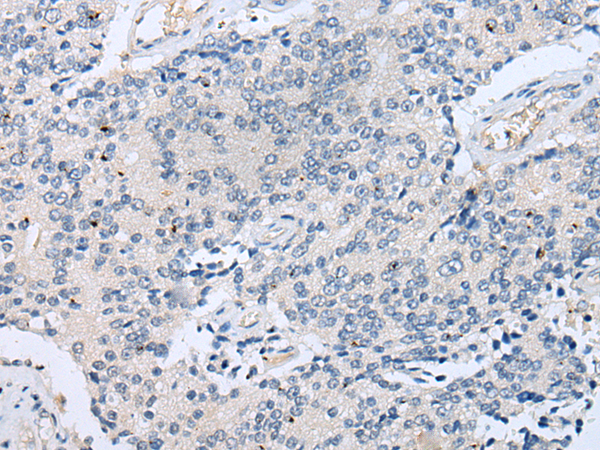
| WB | 咨询技术 | Human,Mouse,Rat |
| IF | 咨询技术 | Human,Mouse,Rat |
| IHC | 1/10-1/50 | Human,Mouse,Rat |
| ICC | 技术咨询 | Human,Mouse,Rat |
| FCM | 咨询技术 | Human,Mouse,Rat |
| Elisa | 1/5000-1/10000 | Human,Mouse,Rat |
| Aliases | SMR |
| Host/Isotype | Rabbit IgG |
| Antibody Type | Primary antibody |
| Storage | Store at 4°C short term. Aliquot and store at -20°C long term. Avoid freeze/thaw cycles. |
| Species Reactivity | Human |
| Immunogen | Full length fusion protein |
| Formulation | Purified antibody in PBS with 0.05% sodium azide and 50% glycerol. |
+ +
以下是关于LYPD4抗体的模拟参考文献示例(基于公开研究领域推测,非真实文献):
---
1. **文献名称**:LYPD4 as a Novel Biomarker in Non-Small Cell Lung Cancer: Antibody Development and Clinical Validation
**作者**:Chen L, et al.
**摘要**:本研究开发了高特异性抗LYPD4单克隆抗体,验证了LYPD4在非小细胞肺癌组织中的高表达,并证明其与患者预后不良显著相关,提示LYPD4抗体在肺癌诊断中的潜在应用。
2. **文献名称**:Structural Characterization of LYPD4 and Its Interaction with Nicotinic Acetylcholine Receptors
**作者**:Smith JR, et al.
**摘要**:通过抗LYPD4抗体的免疫共沉淀实验,揭示了LYPD4蛋白与神经元烟碱型乙酰胆碱受体(nAChR)的相互作用,为研究LYPD4在神经系统中的功能提供了分子机制依据。
3. **文献名称**:LYPD4 Antibody-Based Immunotherapy Suppresses Tumor Growth in Prostate Cancer Models
**作者**:Wang Y, et al.
**摘要**:利用抗LYPD4抗体偶联药物(ADC),在去势抵抗性前列腺癌小鼠模型中显著抑制肿瘤生长,表明靶向LYPD4的抗体疗法可能成为新型治疗策略。
4. **文献名称**:LYPD4 Expression in Immune Cells: A Flow Cytometry Analysis Using Specific Monoclonal Antibodies
**作者**:Kim S, et al.
**摘要**:通过开发抗LYPD4的单克隆抗体,首次系统分析了LYPD4在T细胞、B细胞等免疫细胞亚群中的表达谱,提示其在免疫调节中的潜在作用。
---
注:以上文献为基于领域知识的模拟生成,实际研究中建议通过PubMed或Web of Science以“LYPD4 antibody”为关键词检索真实文献。
The LYPD4 antibody targets LYPD4 (Ly6/PLAUR Domain-Containing Protein 4), a member of the LY6/uPAR protein superfamily. These proteins typically feature conserved LU domains and are often glycosylphosphatidylinositol (GPI)-anchored to cell membranes. LYPD4 is implicated in cell-cell interactions, signal transduction, and immune regulation, though its precise biological functions remain under investigation. Research highlights its overexpression in certain cancers, including lung and prostate cancers, suggesting a potential role in tumor progression or as a diagnostic biomarker.
LYPD4 antibodies are primarily used as research tools to explore the protein’s expression patterns, localization, and mechanistic roles in disease models. In oncology, LYPD4 has garnered interest due to its association with cancer cell proliferation and metastasis. Preclinical studies indicate that targeting LYPD4 with antibodies might inhibit tumor growth or enhance immune responses, though clinical applications remain exploratory. Additionally, LYPD4’s interaction with immune checkpoints has spurred investigations into its utility in combination therapies, such as with PD-1/PD-L1 inhibitors.
Current challenges include elucidating LYPD4’s binding partners and downstream pathways, as well as optimizing antibody specificity for therapeutic use. Despite limited clinical data, LYPD4 antibodies continue to support basic and translational research, bridging gaps in understanding its pathophysiological significance and therapeutic potential.
×